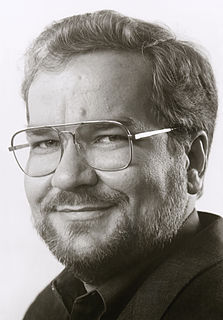A Quote by Steven Pinker
I don't think language could have evolved if it was the only distinctive trait. It goes hand in hand with our ability to develop tools and technologies, and also with the fact that we cooperate with nonrelatives.
Related Quotes
I think that human beings have gotten as far as we've gotten because of our adaptability, our ability to adapt, and our ability to dovetail our technologies - our brains to our tools. With the Industrial Revolution, we transcended the limits of our muscles. With the digital revolution, we transcend the limits of our minds.
Evolutionary biologists often appeal to parsimony when they seek to explain why organisms "match" with respect to a given trait. For example, why do almost all the organisms that are alive today on our planet use the same genetic code? If they share a common ancestor, the code could have evolved just once and then been inherited from the most recent common ancestor that present organisms share. On the other hand, if organisms in different species share no common ancestors, the code must have evolved repeatedly.
There is always this interesting relationship we have with technology. When we invented writing Socrates used to say it was going to rot our brains because we were going to write everything down and not have to remember anything, and so it would atrophy our brains. So there has always been this human drive on the one hand to create tools, to create technologies to overcome our boundaries, but then there is always this reservation, and this fear that say these technologies are somehow unnatural and it is against nature to partake in them.
The most precise work is generally done by hand, with hand tools. Some people rely on machines for their precision, and my way of working is backwards. I rely on the machines for doing the gross stock removal and then, when it comes to the final refinements and fitting of joints and things, making things work together, I rely more on sharp-edged tools that I push by hand.
Morality is essentially a suite of psychological mechanisms that enable us to cooperate. But, biologically at least, we only evolved to cooperate in a tribal way. Individuals who were more cooperative with those around them - could outcompete others who were not. However, we have the capacity to take a step back from this and ask what a more global morality would look like. Why are the lives of people on the other side of the world worth any less than those in my immediate community? Going through that reasoning process can allow our moral thinking to do something it never evolved to.
Darwin and his successors have railed against the fallacy of confusing the current utility of a trait with the reason the trait evolved. For example, Darwin argued that skull sutures in mammals did not evolve because they facilitate live birth; the sutures were in place well before live birth evolved. Checking the chronological order in which different traits evolved in a lineage is one way to test an adaptive hypothesis; the fact of common ancestry is what makes that checking possible.
The credit of my good upbringing goes to my mother, who's not only been a single parent to my brother and I, but she's also been 'our' manager for the longest time. Our father, on the other hand, remained elusive and away from the family for most part of our lives, which left a certain void but also made us creative and reflective.



































